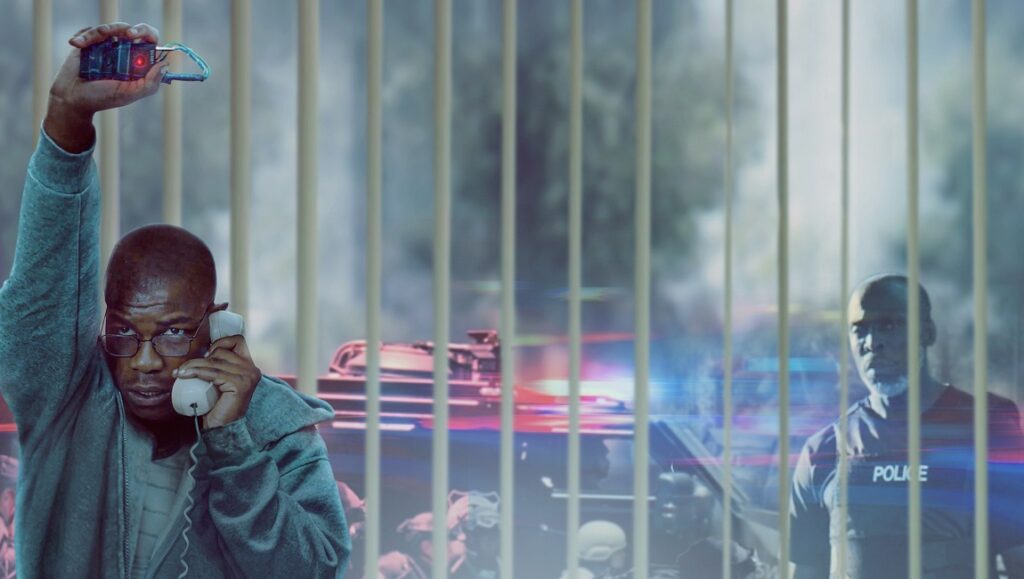Breaking certainly tells a necessary story, but it largely boils itself down to basic action theatrics and undermines any noble intent.
Breaking, the feature directorial debut from Abi Damaris Corbin, attempts to tell the true-life tale of ex-Marine Brian Brown-Easley, who in 2017 walked into a Wells Fargo Bank in Atlanta, Georgia and, armed with a bomb, took two hostages in a desperate attempt to get back what was rightfully his. The title refers to the amount of money owed to Brown-Easley by Veteran Affairs, who mistakenly seized a disability check to pay for outstanding debts, and through his actions, he hoped to shed light on a government that regarded its former soldiers as nothing more than disposable parts once their services were no longer needed. Which is to say, Breaking is notably well-intentioned. Unfortunately, Corbin’s portrayal of these particular events frequently comes across as Hollywood-ized pandering, a ripped-from-the-headlines thriller that adopts a posture of topicality but is, in truth, primarily interested only in delivering cheap thrills in the name of a good time. If the logline sounds familiar, Breaking is indeed quite reminiscent of John Q, that half-remembered Denzel Washington thriller from 2002 in which a financially strapped father seized control of a hospital emergency room in order to get his son the medical attention he so desperately needed.
The Brown-Easley of Breaking, as portrayed by John Boyega, is a good-hearted man prone to acts of aggression, barely living above the poverty line and one check away from the streets. His ex-wife (Olivia Washington) has no patience for his volatile mood swings or the empty promises made to their daughter, who is presented here as a scripture-spouting vessel of innocence and purity who simply wants a puppy and to name it after a Lord of the Rings character. Given this setup, it would be easy to assume that Brown-Easley’s actions were motivated by a mingling of paternal love and rage at the system, a la John Q, but, Breaking makes explicit that the former Marine also suffered from PTSD-related mental health issues that affected his grip on reality, his reluctance to take daily medications altering his emotional state and cognitive reasoning. And while Breaking finds cause in righteous anger regarding America’s treatment of its veterans, its vitriol is just as forcibly aimed at the systemic racism inherent within the country’s institutions. Boyega’s Brown-Easley repeatedly discusses how the SWAT teams outside of the bank will show no hesitation in gunning down a black man if given the opportunity, regardless of the promises made by an empathetic hostage negotiator (Michael K. Williams) or a news producer (Connie Britton) covering his story. It’s for this reason that Breaking’s conclusion is never in question, sapping the film of any tension while simultaneously, depressingly vindicating the fears of the man it desperately tries to humanize.
Unfortunately, Boyega simply isn’t up to the demands of the role, employing a melodramatic style that actually fits the film around him but fails to engage on a purely emotional level. In other words, you can feel Boyega trying here, at the expense of any naturalism that would have otherwise lent a more sensitive texture. What seems like a reach for the complexity of Al Pacino in Dog Day Afternoon instead lands more on the register of Eddie Redmayne in Jupiter Ascending, where dialogue delivered at a level barely above a whisper whiplashes into bouts of over-exaggerated screaming that seems far too calculated to be truly believable. For his part, Corbin manages to lend the film the sheen of a big-budget thriller that belies its indie roots, the crisp cinematography courtesy of Doug Emmett working in tandem with Chris Witt’s accomplished editing to deliver a film that moves swiftly, but it’s only in service of obvious platitudes about the situation at hand. What does impress, however, is how the aftermath of the film’s events is presented: there is a deep respect paid to its true-life participants, a too-rare eschewing of sensationalism in favor of a quiet dignity that proves both more heartfelt and more haunting than expected. Nicole Beharie and Selenis Leyva, portraying the two hostages kept under Brown-Easley’s watch, are likewise excellent in surprising ways, bringing a raw authenticity that the rest of the film unfortunately cannot or will not match. And it’s moving to see Williams in his final film role, the actor hinting at hidden reservoirs within a man who has seen these events play out before, and fatalistically knows how they will end, despite his role in the drama. But those high notes are mostly supplemental, and while the necessity of telling stories like Brown-Easley’s is not in doubt, the particular execution of Breaking is, boiling itself down to basic action-film theatrics and undermining any noble intent.
Originally published as part of Sundance Film Festival 2022 — Dispatch 3.


Comments are closed.